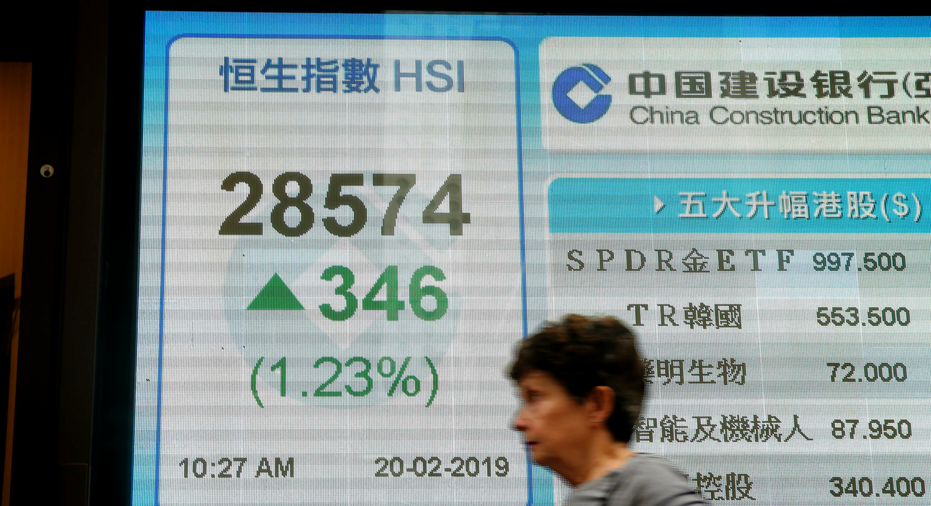World shares mostly higher on upbeat talk on China-US trade
A woman walks past an electronic board showing Hong Kong share index outside a bank in Hong Kong, Wednesday, Feb. 20, 2019. Shares were mostly higher in Asia on Wednesday after a modestly high finish on Wall Street that extended the market’s gains into a fourth week.(AP Photo/Kin Cheung)
BANGKOK – Stocks were mostly higher in Europe and Asia on Wednesday after U.S. President Donald Trump suggested trade talks with China do not face a hard March 1 deadline for a deal.
Negotiators from both sides resumed talks Tuesday in Washington following discussions in Beijing last week that U.S. officials said had made some progress on difficult issues such as China's blueprint for making its industries world leaders in advanced technologies such as robotics and artificial intelligence.
"They are very complex talks. They're going very well," Trump told reporters Tuesday.
Trump has hiked tariffs on billions of dollars' worth of Chinese goods and the U.S. is due to increase them on March 2, following a 90-day truce to allow time for the negotiations now underway.
But Trump indicated there might not be a hard deadline for striking a deal, saying that March 1 is "not a magical date."
That lifted the mood of investors jittery over further potential disruptions to world markets and trade.
Germany's DAX jumped 0.3 percent to 11,343 and the FTSE 100 in Britain added 0.3 percent to 7,199. The CAC 40 in France also picked up 0.3 percent to 5,174.
Wall Street was poised for a slightly lower or flat open, with the future contract for the Dow 0.1 percent lower at 25,848 and the S&P 500 also down about 0.1 percent, at 2,776.
In Asia, Japan's Nikkei 225 index rose 0.6 percent to close at 21,431.49 despite news that Japan's exports sank 8.4 percent in January from a year earlier, far more than forecast.
Hong Kong's Hang Seng index jumped 1.0 percent to 28,514.05 and the Shanghai Composite reversed early losses to gain 0.2 percent, finishing at 2,761.22. South Korea's Kospi jumped 1.1 percent to 2,229.76 and the S&P ASX 200 slipped 0.2 percent to 6,096.50.
JAPAN TRADE: A 17 percent drop in Japan's exports to China and 13 percent decline in exports to the rest of Asia including China helped drag overall exports sharply lower. Japan's imports fell 0.6 percent, leaving a deficit of 1.4 trillion yen ($12.8 billion), up 50 percent from a year earlier and the biggest such gap since March 2014. The weak numbers suggest China's slowdown and trade tensions with the United States are hurting demand.
CURRENCIES: The dollar rose to 110.80 yen from 110.63 yen on Tuesday. The euro ticked down slightly to $1.1329 from $1.1343.
ENERGY: U.S. benchmark crude shed 43 cents to $56.66 per barrel in electronic trading on the New York Mercantile Exchange. Brent crude, the standard for international oil prices, lost 56 cents to $65.89 per barrel.
___
Matt Ott in Madrid contributed to this report.





















